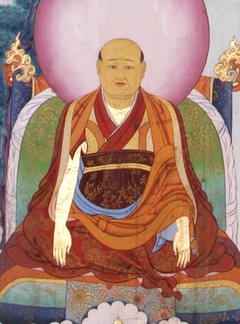Outline of Five Great Sages' Confession
Topical Outline of the General Confession Spoken by the Five Great Sages[1]
by Patrul Rinpoche
I. Bringing to Mind the Witnesses to Confession
Victorious sugatas of past, present and future, together with your retinues,
And all you protectors bound by your vajra oath, turn your attention towards us!
II. The Actual Confession
A. The Confession of the Principal Vidyādharas
1. General Themes
a. Bodhichitta, the Basis
First we arouse bodhichitta and set our minds upon supreme awakening.
b. The Fruition, the Ultimate Attainment
Then, to reach the enlightened stage of an accomplished vidyādhara,
c. The Various Types of Samaya to be Kept
And achieve the vajra body, speech and mind,
We bring to mind each category of samaya commitment
To the yidam deity and the vajra master, together with all the secret commitments,
d. The Dangers of Impairments to the Samaya
And make a pledge never to transgress the commands,
Or else be born in hell according to our karmic fortune.
2. The Confession of Particular Transgressions
a. Root Samaya Commitments
i. Explanation of the Samayas of Enlightened Body
Straying into desire, anger, dull indifference, pride,
Jealousy and so on, we have committed mistakes:
To the torch-like teacher, the vajra master,
We have been deeply disrespectful, and impaired our samayas,
Towards our vajra brothers and sisters who share the same commitments,
We have held cruel intentions, mistaken views and so on—
All these impairments in the samayas of enlightened body, we now confess!
ii. Explanation of the Samayas of Enlightened Speech
We have not visualized clearly the ‘mudrā’ of the yidam deity,
We have interrupted the recitation of the approach mantra,
And failed to practise at the six times[2], but, in particular,
We have not performed the fufilment rituals of approach and accomplishment,
And are incapable of following commands or written instructions—
All these impairments in the samayas of enlightened speech, we now confess!
iii. Explanation of the Samayas of Enlightened Mind
Through the loving kindness of the vajra master,
His words have poured through our ears into the centre of our hearts,
But we pollute the samaya by revealing the wisdom-mind instructions,
And crossing the bounds of secrecy with our mindless chatter and so forth—
All these impairments in the samayas of enlightened mind, we now confess!
b. Branch Samaya Commitments
i. Actual
We have failed to realize the equality of all phenomena—
Impairments of the branch samayas, we now confess!
ii. Samayas Particularly Related to Practice
We have been overcome by laziness, indifference and lethargy—
Impairments of the samayas of approach and accomplishment, we now confess!
iii. Conclusion
Physically, verbally and mentally, we have failed to keep the commitments—
Impairments of the samayas of enlightened body, speech and mind, we now confess!
B. The Confession of the Ordinary Retinue
In the enlightened presence of our venerable teachers,
Our material offerings have been meagre and insubstantial—this we now confess!
In the enlightened presence of the yidam deities,
We have held preferences, favouring some while rejecting others[3]—this we now confess!
In the enlightened presence of the four classes of ḍākinī,
We have impaired our pledges and commitments—this we now confess!
In the enlightened presence of the dharma protectors and guardians,
We have allowed months and years to pass without offering tormas—this we now confess!
In the presence of our mothers and fathers from past, present and future,
We have not repaid them for their kindness—this we now confess!
In the presence of our vajra brothers and sisters and consorts,
We confess that our commitment and affection have been weak!
In the presence of the beings of the six realms,
We confess that our compassion and altruism have been weak!
Any impairments and breakages in the vows of individual liberation,
The discipline of the bodhisattvas,
Mantra commitments of the vidyādharas and so on,
All these we now confess without hiding or concealing anything—
From now on we will refrain from all such acts, and vow never to repeat them again.
As we confess all our harmful acts and obscurations of the past, present and future,
Let them all be completely purified, and so grant us, we pray,
Attainments, ordinary and supreme, of body, speech and mind!
| Translated by Adam Pearcey, 2007. Revised 2015.
Bibliography
Tibetan Edition
o rgyan 'jigs med chos kyi dbang po. "dam pa'i rigs can drwa ma lnga dang rig 'dzin 'dus pa'i 'khor gyi gsung spyi bshags dus gsum bde gshegs ma'i sa bcad/" in gsung 'bum/_o rgyan 'jigs med chos kyi dbang po. BDRC W1PD107142. 8 vols. Chengdu: si khron dpe skrun tshogs pa/ si khron mi rigs dpe skrun khang, 2009, vol. 3: 69–70
Version 2.1: 20220902
-
The five great sages or five excellent ones of sublime nobility (dam pa'i rigs can dra ma lnga) received the Mahāyoga and Anuyoga tantras from Vajrapāṇi at the summit of Mount Malaya. They were the god Yaśasvī Varapāla (grags ldan mchog skyong), the nāga king Takṣaka (klu rgyal ’jog po), the yakṣa Ulkāmukha (skar mda’ gdong), the rākṣasa Matyaupāyika (blo gros thabs ldan), and the human being Licchavi Vimalakīrti (dri med grags pa). ↩
-
Dawn, morning, midday, afternoon, dusk and midnight. ↩
-
Picking and choosing among the deities, favouring the sādhanas of some yidam deities and rejecting others. ↩
